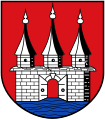Boroughs (including historical)
Altona
- Borough of Altona (Current)
- City of Altona (Until 1937, but still sometimes used)
- City of Altona (Old)
- Coat of Arms of the City of Altona painted on glass around the 17th/ 18th century
Harburg
- Harburg (Current)
- Harburg-Wilhelmsburg 1927–1937
- Harburg 1907


















